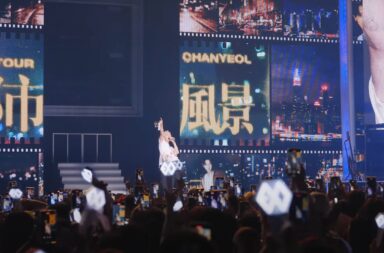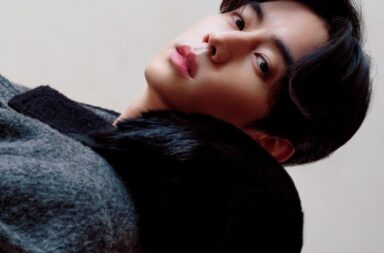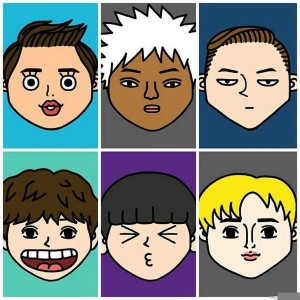 Fandoms are strong collective units, with or without nationalist fervor, favouring adherence to rebellion. Call it the bandwagon psychology or unity in diversity, it is a truth universally acknowledged that we sigh collectively, flail collectively, donate our ovaries collectively and isolate miscreants collectively. But even this tight-knit community faces adversities; their loyalties are tested, their patience pricked.
Fandoms are strong collective units, with or without nationalist fervor, favouring adherence to rebellion. Call it the bandwagon psychology or unity in diversity, it is a truth universally acknowledged that we sigh collectively, flail collectively, donate our ovaries collectively and isolate miscreants collectively. But even this tight-knit community faces adversities; their loyalties are tested, their patience pricked.
Recently, Kai cracked a disability joke in one of Chanyeol’s instagram video asking Sehun whether he was handicapped since his vision was compromised under the VR goggles. Quite expectedly, this hilarious joke went unnoticed by the fandom and later flared up into a controversy when some fans considered it offensive. Chanyeol took down the video while the fandom did what it does best – “Oppa didn’t mean it!”
No, oppa didn’t mean to be offensive to the disabled. Chanyeol never intended to offend all dark-skinned people. C.A.P didn’t intend to be a misogynistic mess (okay, maybe this one did). Jackson didn’t intend to offend the Black community. 90% offenders on “offensivekpop” never intend the harm caused but does that make invisible the harm? Does that wipe away the fact that their ‘jokes’ were derisive and used marginalized communities as punch lines? Let’s be crystal clear about this right from the beginning — intent never matters.
That’s step one to understanding problematic biases: measure their offense not by their intent but the harm caused. Step two is weighing the gravity of the harm. This is an extremely tricky area because privilege plays a huge role in deciding what one deems as substantial harm. For a white man, a colourist comment maybe offensive but not harmful but for a woman of color, a colourist comment is a short but powerful reminder of the constant dehumanization she is subjected to on a daily basis. It is not merely offensive, it’s violence.
Ask yourself a simple question: Would I say this to — in Kai’s case — a disabled person? If the answer is no or even maybe, you know your bias has crossed the line and it’s time for him to be dragged back into his limits. The only clear division that one can make in this case is you can’t put Kai and Kim Hyun-joong on the same scale. You can’t equate brutal intimate partner violence with microaggression.
Which brings me to step three: You don’t need to disown your bias because (s)he is an ignorant asshole. Far too many times, I have found myself questioning Baekhyun fans on how could they possibly stan this regular offender of sanity and sentiments. But then Kai dropped the n-word and the disability joke, and I understood the politics of fangirling a little better.
Idols are essentially for our entertainment. They exist both for the fandom and because of the fandom. If we were to indulge on a disowning spree, we would have to disown all forms of entertainment because popular media runs on flawed and demeaning representations. In the end, it is the consumer who is being completely deprived of pleasure. Unfortunately, your boycotting an idol doesn’t really affect the industry. The K-pop industry functions in mysterious ways. On one hand, they love raving about the Hallyu wave while on the other hand, the moment they are accused of microaggressions, usually by international fans, they dive back into their little rabbit hole of naivety and ignorance. All of a sudden, they are just a localized entertainment project, an island nation with no connection with the outside world.
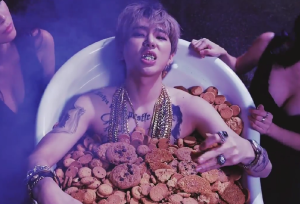 The K-pop industry does not consider itself accountable to fans. It may worry about offending Korean fans but the rest of the world could feel abused and humiliated and the industry wouldn’t bat an eyelid. They don’t care. Therefore, giving up your bias for the sake of cosmic justice only leaves you feeling pissed – either you go back on your word and reclaim your bias or you just sit and grumble as other people flail over that convicted felon.
The K-pop industry does not consider itself accountable to fans. It may worry about offending Korean fans but the rest of the world could feel abused and humiliated and the industry wouldn’t bat an eyelid. They don’t care. Therefore, giving up your bias for the sake of cosmic justice only leaves you feeling pissed – either you go back on your word and reclaim your bias or you just sit and grumble as other people flail over that convicted felon.
Does that imply letting your bias off the hook for his offenses? Of course not. Step four is all about tough love. If you want to be a responsible fan, drag your bias. Whether you want to do it tumblr style, twitter style, facebook style, whichever way you prefer, dragging is a must. I am not here to tone police communities who are regular victims of an idol’s ignorance. Be angry, sarcastic, salty, sweet, inedible, but, the one thing to keep in mind is that to make sure the conversation, however one-sided, is productive. You have all the right in the world to spew angry comments but the anger can be turned productive if it is directed towards preventing such mistakes in the future i.e., if the heavy dose of snark, wit and hurt can help educate the idols.
Unlike Western artists, who are artfully dragged by good, bad and ugly sites via articles and social media and are forced by their companies to at least acknowledge their mistakes and address the issues, nothing of that sort happens in K-pop because communication is a major problem. English articles are going to sound as alien to an idol as their Korean word puns to me. Some Koreans fans may bother to translate a burning controversy within the international fandom but most of the times they won’t which is also why we have repeated offenders.
Idols are products, participants and consumers of the same media as us but their engagement with it may not be as nuanced. Serious college education is practically absent from the idol sphere. Their schooling itself is rushed; a mere symbolic gesture at getting an education. Embroiled in tough schedules, idols barely have the time to maintain a healthy lifestyle much less read through peer reviewed articles on gender, race, sexuality and disability.
Since companies don’t care about an idol’s awareness, they are not even provided with basic resources to build up on their socio-political knowledge. Not only is their access to resources limited, their interaction with people from different race, gender, age, etc. is highly compromised, busy as they are shuttling between music shows, home and dorm. It is also understandable that in the little time of rest that they get on rare occasions, none would be inclined to devote it to reading dense theories.
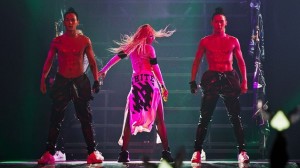 Your bias deserves a chance or two in rectifying his mistakes more than the average person but the chance is not a pass, it is instead an opportunity for fans to inundate an idol’s social media, if any, with comments on why it is wrong than stating over and over again what is wrong. And it can’t be a single person’s effort. Fandoms are collective units, remember? We contribute in bits to the conversation. It is impossible for a single fan to accumulate all points and present it to the idol. It is possible that the idol may completely overlook that long comment. However, when all fans contribute in bits on a single post on why something is offensive your bias is bound to take notice.
Your bias deserves a chance or two in rectifying his mistakes more than the average person but the chance is not a pass, it is instead an opportunity for fans to inundate an idol’s social media, if any, with comments on why it is wrong than stating over and over again what is wrong. And it can’t be a single person’s effort. Fandoms are collective units, remember? We contribute in bits to the conversation. It is impossible for a single fan to accumulate all points and present it to the idol. It is possible that the idol may completely overlook that long comment. However, when all fans contribute in bits on a single post on why something is offensive your bias is bound to take notice.
Not only does it open up a conversation with your bias, it also opens up a conversation within the fandom with fans drawing in on their experiences as tools to explain oppression. You may not know a thing about Islam and may have not even bothered to look it up, but the B1A4 and CL‘s “MTBD” scandal managed to start a conversation on Islam and cultural appropriations with Muslim fans providing varied points of view. People didn’t reach a resolution on the issue but a resolution is not what I am concerned with. It is the process towards the resolution which matters.
Which brings me to step five: Don’t feel pressurized to pick sides. Neither are you compelled to defend your bias nor are you compelled to side with marginalized groups immediately. Sometimes being in doubt is ten times better than being an all-knowing ignoramus. There is no need to weigh in on the debate if you feel uncomfortable. You don’t know about something? Great! Comfort yourself listening to all points of view with special attention to those who have felt hurt by the microaggression. Read up on the issue concerned. If you have time to scroll through the bazillion pictures of your bias, you sure as hell have time to read one good article on blackface.
Does it trigger past passive or active violence? Stop. Indulge in puppy videos. No bias is more important than your mental and physical well-being. If later one feels like presenting their point of view, go ahead, but not at the cost of your own well being. Never at the cost of your own well being.
Under no circumstance should one feel pressurized by the fandom to pick sides but let not the inability of picking sides be born from sheer laziness and indifference because that’s privilege 101. Just because it doesn’t affect you doesn’t mean it’s not important or offensive. The idea is to make a bad situation of a microaggresion turn into a productive conversation on privilege and oppression, and laziness won’t be contributing much to it.
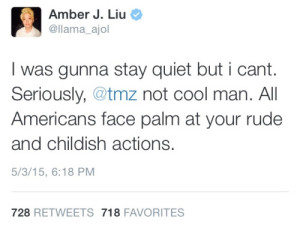 Step six: “Kill yourself” isn’t going to solve anything. Being angry doesn’t equate to being murderous. Participating in online abuse knowingly doesn’t make you any better than your ignorant bias. If killing people solved problems then I would have to kill the entire human race because let’s not act as if we aren’t guilty of microaggressions. The liberal use of “crazy fangirls” within the fandom discourse is ableist and sexist but either some of us don’t know why it is so or brush it off as “I didn’t mean offend anyone” bringing us back to step one. All of us are in this mess together except some are apologetic and willing to educate themselves, some are only apologetic and some prefer being arrogant potatoes.
Step six: “Kill yourself” isn’t going to solve anything. Being angry doesn’t equate to being murderous. Participating in online abuse knowingly doesn’t make you any better than your ignorant bias. If killing people solved problems then I would have to kill the entire human race because let’s not act as if we aren’t guilty of microaggressions. The liberal use of “crazy fangirls” within the fandom discourse is ableist and sexist but either some of us don’t know why it is so or brush it off as “I didn’t mean offend anyone” bringing us back to step one. All of us are in this mess together except some are apologetic and willing to educate themselves, some are only apologetic and some prefer being arrogant potatoes.
Is there a 100% guarantee that my bias will turn over a new leaf after I go through all this trouble? Sadly, no. Kai may not pay heed to my pleas. N may still be subjected to colourist remarks. Ha-young may not stop referring to herself as an Indian princess. All my biases will still claim fair, pure, skinny, long haired ghosts girls as their ideal types. But it’s not as if change hasn’t taken place. Maybe not in your bias but within the fandom there are fans who are more aware than before, who most probably have been employed with jargon to define their oppression, who now how have more nuanced interactions with each other, and who know that loving oppa isn’t unconditional but is subject to deal breakers.
Aware and informed consumption is the key to loving problematic biases. One of the interesting yet scary parts about K-pop is defining the love you feel for your bias. I am not denying the intense love fans feel for their bias; it is not merely “hormones” or obsession. There is something far more gripping yet ethical in the relationship fans usually share with their biases which is why it is so difficult to just cut off ties with a bias after (s)he decides to act obnoxious. There are cases like Jackson’s who have been quick and sincere in apologizing for their misdemeanor, but even when that apology doesn’t transpire, the most we bias fools can do is be aware and critical of our biases. It is better to dust the carpet than shove your bias’ mistakes underneath.
(Youtube. Friday Korea, Pann. Images via Twitter, Seven Seasons, YG Entertainment)
